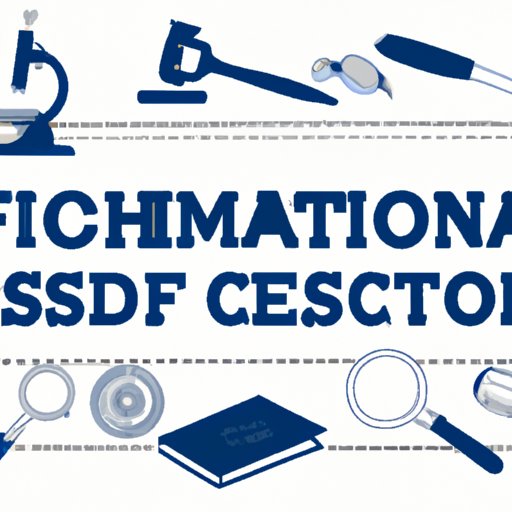Introduction
Forensic science is a rapidly growing field that combines scientific principles and methods with investigative techniques to uncover facts and solve crimes. It is a multidisciplinary field that draws on disciplines such as biology, chemistry, physics, engineering, genetics, computer science, psychology, and law. Forensic science has become increasingly important in criminal investigations, civil lawsuits, and medical and scientific research.
Types of Cases Handled by Forensic Scientists
Forensic scientists are often called upon to provide expert testimony in criminal trials. They use their scientific expertise to analyze physical evidence, such as fingerprints, blood, hair, and fibers, and use this evidence to help determine guilt or innocence. In addition, forensic scientists may be involved in civil lawsuits, where they use their knowledge to provide evidence regarding liability or negligence.
Forensic scientists are also involved in medical and scientific research. They use their expertise to analyze DNA samples, study medical records, and develop new technologies for crime scene analysis. By studying the evidence, they can provide insight into how diseases and illnesses spread, potentially leading to new treatments and prevention strategies.
Career Paths in Forensic Science
There are several different career paths available in forensic science. Specialists are typically employed by police departments and other law enforcement agencies to analyze evidence from crime scenes. Laboratory technicians work in laboratories and use their scientific knowledge to analyze evidence. Investigators are employed by private companies and government agencies to investigate criminal activities.
Forensic scientists may also work in academia, teaching courses in forensic science at universities and colleges. They may also work in corporate settings, helping companies conduct internal investigations and providing expert testimony in civil litigation.

Education and Training Required for a Career in Forensic Science
Most positions in forensic science require a bachelor’s degree in a relevant field, such as biology, chemistry, or forensic science. In addition, some positions require certification in specific areas, such as fingerprint analysis or DNA analysis. Many employers also prefer applicants who have experience working in a laboratory setting.
Forensic scientists must also stay up to date on the latest developments in the field. They must attend conferences and seminars to learn about new technologies and techniques, as well as legal changes that may affect their work.

The Role of Technology in Forensic Science
Technology plays an important role in forensic science. Computer forensics involves the recovery and analysis of digital evidence, such as emails, text messages, and social media posts. DNA analysis is used to identify suspects and victims, and to verify paternity. Digital evidence analysis involves the examination of computers, cell phones, and other devices to uncover evidence of criminal activity.
In addition, technological advances have made it possible to analyze evidence more quickly and accurately than ever before. For example, DNA testing can now be completed in a matter of hours, whereas it used to take days or weeks. This has helped to expedite criminal investigations and civil litigation.

Impact of Forensic Science on Society
Forensic science has had a profound impact on society. By increasing public safety, forensic science has helped to reduce crime rates and deter criminals. It has also facilitated justice by providing clear evidence of guilt or innocence in criminal trials. Finally, it has enhanced evidence-based decision making in both the public and private sectors.
As forensic science continues to evolve, it will become increasingly important in criminal investigations, civil litigation, and medical and scientific research. Its impact on society will only grow, making it an invaluable tool for law enforcement, the courts, and the public.
Conclusion
Forensic science is a rapidly growing field that combines scientific principles and methods with investigative techniques to uncover facts and solve crimes. It is used in criminal investigations, civil lawsuits, and medical and scientific research. To pursue a career in forensic science, individuals must obtain a bachelor’s degree in a relevant field and obtain certifications in specific areas. Technology plays an important role in forensic science, allowing for quicker and more accurate analysis of evidence. Finally, forensic science has had a profound impact on society, increasing public safety, facilitating justice, and enhancing evidence-based decision making.
(Note: Is this article not meeting your expectations? Do you have knowledge or insights to share? Unlock new opportunities and expand your reach by joining our authors team. Click Registration to join us and share your expertise with our readers.)
